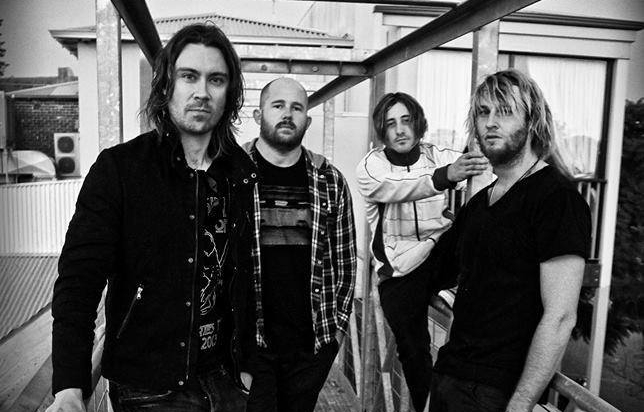“There is a full story line,” Temperley assures me of the creation of A Song is A City. “There are full on highs and lows of the whole experience and it’s nice to be able to reflect on that now that there’s been years in between.”
Eskimo Joe’s future was far from certain prior to the release of A Song is A City. Having released their debut album Girl three years prior and despite receiving a fair amount of support from the airwaves, the band had been dropped from their record label after a rather ugly dispute. Yet despite an uncertain future, the band decided to carry on regardless. It was a time when Western Australia and Fremantle in particular had begun to produce a number of highly regarded bands that were breaking nationally.
“We had this amazing jam room where all these bands like End of Fashion and Little Birdy were coming out of,” remembers Temperley. “We were all jamming on each other’s songs and everyone was making demos and stuff like that. It was a really kind of purple patch period.”
For Eskimo Joe, that period would turn into the writing sessions for A Song is A City. Eventually securing a new record deal with Festival Mushroom Records, Temperley, along with fellow band members, Stuart McLeod (guitar/vocals) and Joel Quartermain (drums/guitar) began to hit their stride creatively.
“As far as our songwriting skills go, we reached this really beautiful point that bands get to, where we started to get a bit of skill level in our song craft,” says Temperley. “You know, no one had really gone off and made lots of money or anything so we were all kind of just like, ‘Hell yeah, let’s just do it, this is amazing.’ So we were really in love with the idea of writing songs and it was starting to show. We basically were developing our own style a bit more for the first time.”
Ten years on, the upcoming tour will be the first time Temperley has performed the entire record from start to finish and without his fellow bandmates. In stripping the songs back and playing them acoustically, they will be performed much the same way as when they were first written.
“We wrote that record all on acoustic guitars, on pianos,” he reflects. “Like our thing was that it had to work on a guitar; like on one acoustic or a piano, otherwise it didn’t go on the record. Since then we’ve done songs in many different ways but it was just lovely to play an album from start to finish and in order. I’d never done that with A Song is A City.”
Each track from the record tells a tale and the album as a whole captures a certain time and place. It’s a deeply personal record yet Temperley won’t be holding back when it comes to what helped inspire and shape the songs.
“A Song is A City was the last thing that I did where I could be a bit more deeply personal,” he admits. “It was before everything with Eskimo Joe blew up. So I think I felt pretty comfortable telling a lot more stories and wearing my heart on my sleeve a little bit more. And I think by the time we got to Black Fingernails, Red Wine, the stories are still personal but I injected a bit more smoke and mirrors in there to get a bit of distance from it.
“That’s a lot of the kind of stories I’m telling,” he continues. “I’ll tell the background of the song technically, like I heard this song, I woke up the next day and was like, ‘I want to write a song like that.’ And then I tell the story about all the stuff that was going on for us and injecting that story into that structure.”
With the time that has passed since the release of A Song is A City, the tour is also a chance for Temperley, as much as the audience, to reflect back on the songs from the record and the stories which helped define them.
“I almost feel like I’m kinda along for the ride as well,” he beams. “I get to be a fan of the album for the first time as well, I don’t have to over think it. When you do a record you think about everything until your brain bleeds and you’re like, ‘Everything has to be right and perfect.’ But this time I don’t have to; I just play it. I don’t have to think about any of that stuff. It’s just like pressing play on an album and just listening to it myself.”
BY JAMES NICOLI







